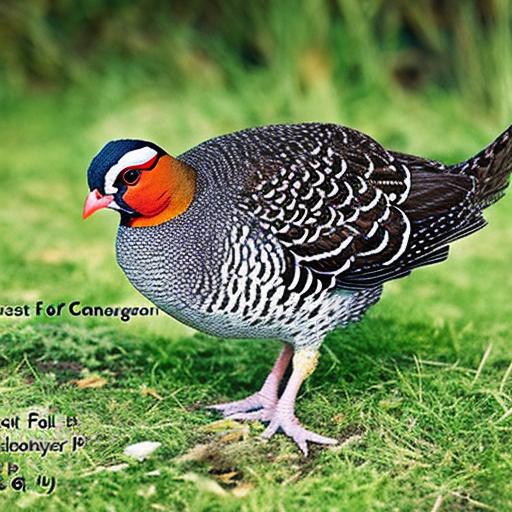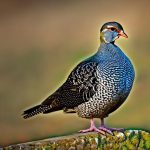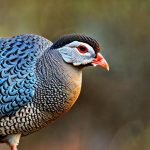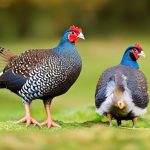Guinea fowl, also known as pintades, are a type of poultry that are native to Africa. They are known for their distinctive appearance, with speckled feathers and a helmet-like crest on their heads. Guinea fowl are popular for their ability to control pests such as ticks, flies, and other insects, making them a valuable addition to any farm or homestead. They are also prized for their flavorful meat, which is lean and rich in nutrients. Guinea fowl are social birds that thrive in small flocks, and they are known for their loud calls and alert nature, making them excellent watchdogs for the farm.
Guinea fowl are hardy birds that can adapt to a variety of climates, making them suitable for a wide range of environments. They are also relatively low-maintenance compared to other types of poultry, making them an attractive option for both experienced and novice bird keepers. With the right care and attention, guinea fowl can thrive and provide a range of benefits to their owners, from pest control to delicious meat and eggs. In this article, we will explore the various aspects of caring for guinea fowl, including creating a suitable habitat, feeding and nutrition, health and wellness, predation and protection, breeding and reproduction, and interacting with these unique and fascinating birds.
Key Takeaways
- Guinea fowl are hardy, low-maintenance birds that are popular for pest control and meat production.
- Creating a suitable habitat for guinea fowl involves providing a secure coop, ample space for foraging, and protection from predators.
- Feeding guinea fowl a balanced diet of commercial feed, grains, and access to insects and greens is essential for their health and productivity.
- Regular health checks, vaccinations, and parasite control are important for maintaining the wellness of guinea fowl.
- Protecting guinea fowl from predators such as foxes, raccoons, and birds of prey is crucial for their safety and well-being.
- Breeding and reproduction of guinea fowl involves providing nesting boxes, proper mating ratios, and incubation of eggs for successful hatching.
- Interacting with guinea fowl can be rewarding, but it’s important to approach them calmly and respectfully to build trust and minimize stress.
Creating a Suitable Habitat for Guinea Fowl
When it comes to creating a suitable habitat for guinea fowl, there are several key factors to consider. First and foremost, guinea fowl require ample space to roam and forage. A large outdoor area with access to grass, shrubs, and insects is ideal for guinea fowl, as they are natural foragers and enjoy exploring their surroundings. It’s important to provide shelter from the elements, such as a coop or sheltered area where the birds can roost at night and seek refuge during inclement weather. The coop should be well-ventilated and provide protection from predators.
In addition to outdoor space and shelter, guinea fowl also require access to clean water and nutritious feed. It’s important to provide fresh water daily, as guinea fowl can be prone to dehydration, especially in hot weather. When it comes to feed, guinea fowl thrive on a diet that includes a mix of grains, seeds, and insects. Commercial poultry feed can also be supplemented with kitchen scraps and garden produce to provide a well-rounded diet for guinea fowl. Overall, creating a suitable habitat for guinea fowl involves providing ample space to roam and forage, shelter from the elements, access to clean water, and a nutritious diet that meets their specific dietary needs.
Feeding and Nutrition for Guinea Fowl
Feeding and nutrition are crucial aspects of caring for guinea fowl. These birds are natural foragers and enjoy a diet that includes a variety of grains, seeds, insects, and vegetation. When it comes to feeding guinea fowl, it’s important to provide a balanced diet that meets their specific nutritional needs. Commercial poultry feed formulated for guinea fowl can be supplemented with kitchen scraps, garden produce, and the occasional treat such as mealworms or crickets.
In addition to providing a nutritious diet, it’s important to ensure that guinea fowl have access to clean water at all times. Dehydration can be a serious issue for guinea fowl, especially in hot weather, so it’s important to regularly check their water supply and ensure that it is clean and fresh. Providing access to clean water and a balanced diet will help ensure that guinea fowl remain healthy and thrive in their environment. Overall, feeding and nutrition are essential aspects of caring for guinea fowl, and providing a well-rounded diet that meets their specific dietary needs is crucial for their health and well-being.
Health and Wellness for Guinea Fowl
Maintaining the health and wellness of guinea fowl is essential for ensuring that they thrive in their environment. Like all poultry, guinea fowl can be susceptible to a range of health issues, including parasites, respiratory infections, and injuries. Regular health checks are important for identifying any potential issues early on and taking appropriate measures to address them. It’s also important to provide a clean and sanitary living environment for guinea fowl, as this can help prevent the spread of disease and parasites.
In addition to regular health checks and a clean living environment, it’s important to provide preventative care for guinea fowl, such as vaccinations and parasite control. Working with a veterinarian who is knowledgeable about poultry care can help ensure that guinea fowl receive the appropriate preventative care to keep them healthy. Overall, maintaining the health and wellness of guinea fowl involves regular health checks, providing a clean living environment, and implementing preventative care measures to keep them healthy and thriving.
Predation and Protection for Guinea Fowl
Predation is a common concern when it comes to caring for guinea fowl, as these birds are natural prey for a variety of predators, including foxes, raccoons, hawks, and owls. Providing adequate protection from predators is essential for ensuring the safety of guinea fowl. This can include measures such as secure fencing around their outdoor area, predator-proof coops or shelters for nighttime roosting, and the use of guard animals such as dogs or geese to help deter potential predators.
In addition to protecting guinea fowl from predators, it’s important to provide them with a safe and secure living environment that is free from hazards such as sharp objects or toxic plants. Regularly inspecting their living area for potential hazards can help prevent accidents and injuries. Overall, predation and protection are important considerations when caring for guinea fowl, and providing adequate protection from predators and creating a safe living environment are essential for ensuring their safety and well-being.
Breeding and Reproduction of Guinea Fowl

Breeding and reproduction are natural behaviors for guinea fowl, and understanding the basics of their reproductive cycle can help bird keepers manage their flock effectively. Guinea fowl typically reach sexual maturity at around six months of age, at which point they may begin mating and laying eggs. It’s important to provide suitable nesting areas for guinea fowl where they can lay their eggs in a safe and secure environment.
When it comes to breeding guinea fowl, it’s important to consider factors such as genetics, temperament, and overall health when selecting breeding stock. Breeding from healthy, well-adjusted birds can help ensure the production of strong offspring with desirable traits. It’s also important to provide appropriate care for broody hens and their chicks to ensure their health and well-being during the rearing process. Overall, understanding the basics of breeding and reproduction in guinea fowl can help bird keepers manage their flock effectively and ensure the production of healthy offspring.
Interacting with Guinea Fowl
Interacting with guinea fowl can be a rewarding experience for bird keepers, as these birds are known for their social nature and unique behaviors. Guinea fowl are naturally curious birds that enjoy exploring their surroundings and interacting with their human caretakers. Spending time with guinea fowl can help build trust and familiarity between the birds and their caretakers, making it easier to handle them for tasks such as health checks or moving them to new areas.
When interacting with guinea fowl, it’s important to approach them calmly and gently to avoid startling or stressing them. Offering treats such as mealworms or seeds can help encourage positive interactions with guinea fowl. It’s also important to observe their behavior closely to understand their individual personalities and preferences. Overall, interacting with guinea fowl can be a rewarding experience that helps build trust and familiarity between the birds and their caretakers while providing opportunities for observation and enrichment for both parties involved.
In conclusion, caring for guinea fowl involves creating a suitable habitat that meets their specific needs in terms of space, shelter, water, and nutrition. Maintaining the health and wellness of guinea fowl involves regular health checks, preventative care measures, and providing a clean living environment. Protecting guinea fowl from predators is essential for ensuring their safety, while understanding the basics of breeding and reproduction can help bird keepers manage their flock effectively. Interacting with guinea fowl can be a rewarding experience that helps build trust and familiarity between the birds and their caretakers while providing opportunities for observation and enrichment. Overall, caring for guinea fowl involves understanding their unique behaviors and needs while providing appropriate care to ensure their health and well-being in a domestic setting.
If you’re considering keeping guinea fowl in your yard, you may also be interested in learning about creating the perfect coop for them. Check out this insightful article on “Large Chicken Coop Ideas” by Poultry Wizard for some great tips and inspiration on designing a spacious and comfortable living space for your guinea fowl. Learn more here.
FAQs
What are guinea fowl?
Guinea fowl are a type of bird that are native to Africa. They are known for their distinctive spotted feathers and loud, chattering calls.
Why would someone want to keep guinea fowl in their yard?
Guinea fowl are often kept for their pest control abilities, as they are known to eat insects, ticks, and other pests. They can also be kept for their meat and eggs.
What do guinea fowl need in terms of housing and space?
Guinea fowl need a secure coop or shelter to protect them from predators and the elements. They also need access to a large outdoor space to roam and forage.
What do guinea fowl eat?
Guinea fowl are omnivores and eat a variety of foods, including insects, seeds, grains, and vegetation. They can also be given commercial poultry feed.
Are guinea fowl noisy?
Yes, guinea fowl are known for their loud calls and can be quite noisy, especially when they feel threatened or are disturbed.
Do guinea fowl get along with other animals?
Guinea fowl can be kept with other poultry, such as chickens and ducks, but they may not get along with other birds or animals. It’s important to introduce them carefully and monitor their interactions.
Are there any health concerns when keeping guinea fowl?
Guinea fowl are generally hardy birds, but they can be susceptible to certain diseases and parasites. It’s important to provide them with proper nutrition, housing, and veterinary care to keep them healthy.
Meet Walter, the feathered-friend fanatic of Florida! Nestled in the sunshine state, Walter struts through life with his feathered companions, clucking his way to happiness. With a coop that’s fancier than a five-star hotel, he’s the Don Juan of the chicken world. When he’s not teaching his hens to do the cha-cha, you’ll find him in a heated debate with his prized rooster, Sir Clucks-a-Lot. Walter’s poultry passion is no yolk; he’s the sunny-side-up guy you never knew you needed in your flock of friends!







